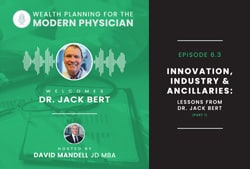In this first part of a two-part episode, host David Mandell welcomes Dr. Jack Bert, a board-certified orthopedic surgeon and former president of the Arthroscopy Association of North America. Dr. Bert shares his background, including his training at Northwestern, Temple, and the Mayo Clinic, as well as his career—building one of the first outpatient ambulatory surgery centers in Minnesota. He highlights how his practice expanded from a solo effort into a large multi-location group, providing insight into the evolution of orthopedic practice models.

(Video Available October 1, 2025 at 6 AM Eastern)
Dr. Bert reflects on the influences that led him to orthopedics, including his brother, a spine surgeon, and his time training with John Lachman. He emphasizes the role of innovation in orthopedic surgery, from pioneering arthroscopic procedures to developing surgical tools and implants. His experiences underscore the importance of adapting to insurance reimbursement models and industry dynamics that affect medical practice and physician compensation.
Beyond his clinical and entrepreneurial achievements, Dr. Bert discusses his involvement with industry partners and his tenure on the board of the Retired NFL Players Association, where he saw firsthand the long-term toll professional football takes on players. He also stresses the importance of ancillary services and delegation for physicians to achieve financial success, drawing parallels between leveraging physician extenders in medicine and delegating financial management to professionals.
INSIGHTS:
- Dr. Jack Bert trained at Northwestern, Temple, and the Mayo Clinic before practicing in St. Paul, Minnesota.
- He helped establish the first outpatient ambulatory surgery center in Minnesota in 1990.
- His orthopedic group grew from 5 physicians to 27, and now operates with over 55 providers across multiple locations.
- Early experience with outpatient unicompartmental knee replacements highlighted challenges with reimbursement models.
- The umbrella corporation structure can provide physicians autonomy while gaining group negotiating power.
- Defined benefit plans and individualized financial strategies allowed physicians within the same group to pursue unique goals.
- Delegating financial management to professionals yields better long-term outcomes than self-directed planning.
- Industry collaboration can provide opportunities, but physicians must protect intellectual property through patents and strong contracts.
- Work with the Retired NFL Players Association revealed significant orthopedic and neurological challenges facing former athletes.
- Ancillary services and leveraging physician assistants are essential for sustaining financial viability in modern practice.

